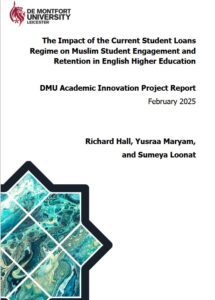With Yusraa Maryam and Sumeya Loonat, I have published a report on The Impact of the Current Student Loans Regime on Muslim Student Engagement and Retention in English Higher Education. The report is based on project work undertaken in the Spring/Summer of 2024, which pivoted around interviews with 12 Muslim undergraduate and post-graduate taught students, who see interest-bearing loans as a barrier to their engagement in higher education. The work was funded internally by De Montfort University’s Academic Innovation Project fund.
It was a privilege to work with Yusraa and Sumeya on this project. Our conversations with the student participants were a gift that we wish to acknowledge. We are also very grateful for the support of the DMU Imam, Mohammed Laher, and the Prayer Room committee at DMU, alongside the Islamic Society.
The report is available here, and can be cited as:
There is much interest in the potential for an alternative funding system for higher education students in England to support the spiritual and worldly needs of British Muslim students. At present those who wish to study in English universities and HE providers are still tied to a financial system that is contentious for many because it is predicated upon paying back interest, known as riba. From Arabic, riba points towards financial arrangements that are a form of usury, and are seen to be exploitative. This is haram, or forbidden, for practicing Muslims. The relationship between access to (and progression through) academic study and engagement with finance is contentious where it reveals the tensions between Islam as a deeply-spiritual, faith-based way of life (in Arabic, deen), and the reality that this way of life is lived, materially, in a worldly existence (in Arabic, dunya).
The extent to which these tensions both play out for Muslim students and impact their lived experiences of HE has received limited attention. Although recent UK Governments have promised an alternative system, and have even engaged in consultation on the issue, there is a need for richer educational research on the impact of this system on Muslims who are trying to adhere to Islamic teachings This report engages with this gap, and discusses one Academic Innovation Project (AIP), funded at De Montfort University (DMU) in the 2023/24 academic session. This project developed, cross-institutionally, the outcomes of a third-year, DMU Education Studies dissertation undertaken in 2022/23, by Yusraa Maryam (with Richard Hall as her supervisor). This dissertation undertook a small scale, qualitative investigation of the experiences of Muslim students who saw interest-bearing loans as a barrier to their higher learning. In the AIP, Yusraa and Richard, working with Sumeya Loonat, extended and enhanced this pilot. Sumeya, a DMU PhD student and a British Muslim female, acted as a research mentor to Yusraa, and this enabled the team to ground this student-led research around retention. At its heart lay a desire to explore the factors that shape retention for Muslim students who see student loans as a barrier to their retention and ability to stay the course.
Thus, we focus on the outcomes of in-depth interviews with 12 British Muslim undergraduate and postgraduate taught students, which were designed to evaluate the impacts of interest-bearing loans on Muslim students retention in one University in English HE. The analysis of these interviews highlighted how the struggle between the spiritual deen and the worldly dunya shaped much of what was reported by these students, with money challenging and conditioning faith. In this, the complex ways in which individuals engage with student finance were related to their spiritual intentions, and this then shaped their educational experiences and choices. Whilst the role of family was important in engaging with their studies, this struggle had an affective, emotional impact. In managing these outcomes, the students demonstrate very deep layers of inner faith, commitment, drive and hope for the future. These are also moulded in family and in community. At the same time, our participants made a plea for the recognition of the significance of this issue for students like them by University senior leaders. At the core of this work, we note that these students are engaged in a struggle for recognition, and in this they deserve to be heard.
